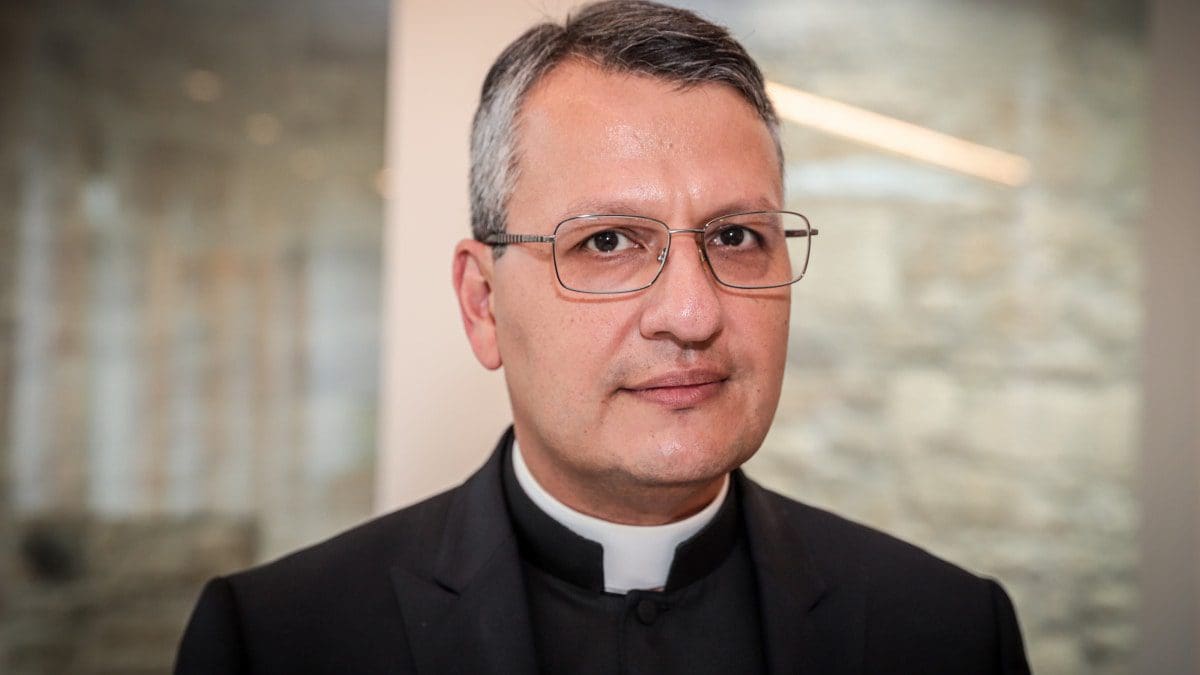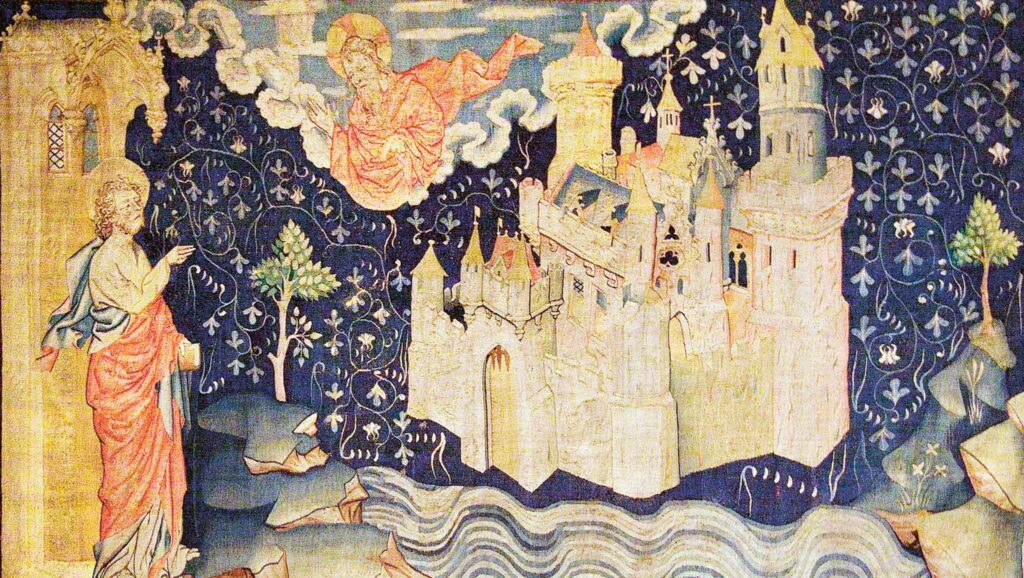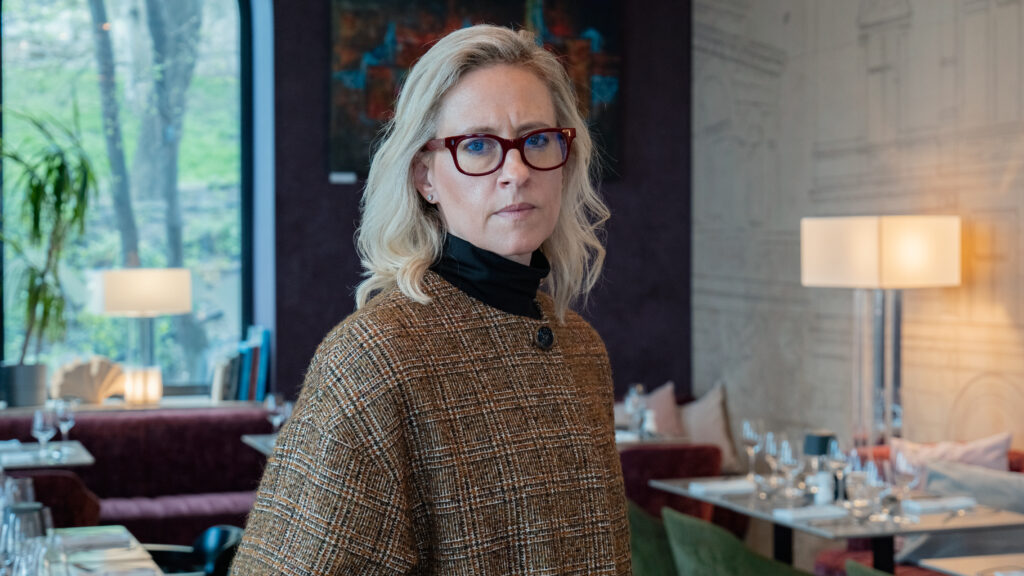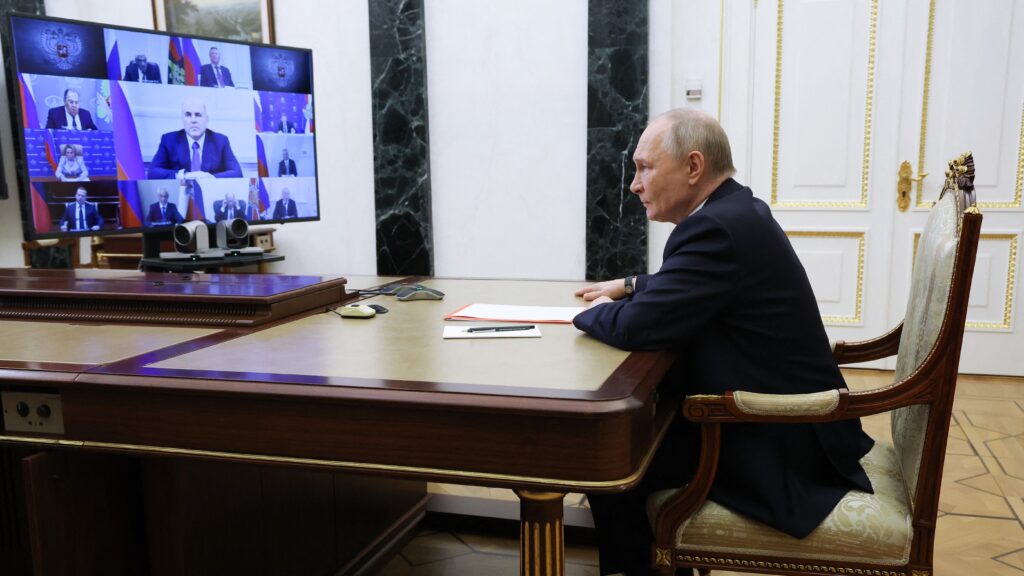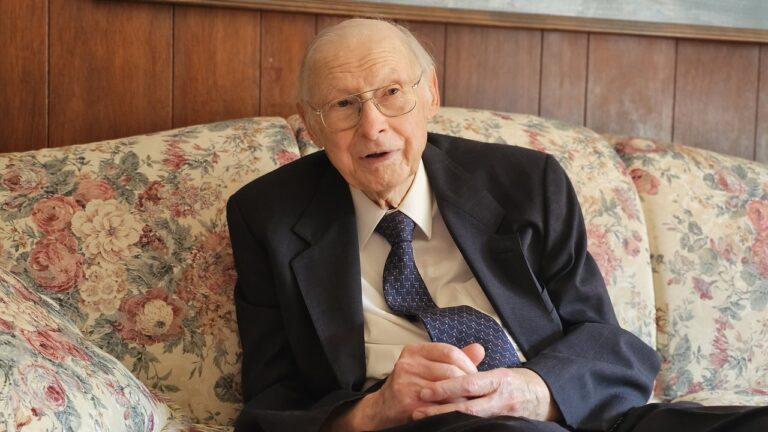Father Mario Alexis Portella, born in New York, is a Catholic priest serving at the Cathedral Santa Maria del Fiore (or as it is commonly known, the Florence Cathedral) and is a chancellor of the Archdiocese of Florence, Italy. Before he completed his doctoral studies in canon law and civil law from the Pontifical Lateran University in Rome, he acquired a BA in Government and Politics from St. John’s University (NY) and an MA in Medieval History from Fordham University (NY). Father Portella is also a prolific writer: he is the author of three books and his articles are published in, among others, Crisis Magazine, European Conservative, and on Faithfreedom.org. We had a chance to interview Father Portella about his research interests, central arguments on Islam, possible Catholic answers, and his relation to Hungary just before his one-day trip to the Benedictine Abbey of Pannonhalma (Hungary).
Looking at your public lectures and publishing activities, it seems that you have a wide range of research interests. You write on Islam, Church issues (including Vatican policies, Christian persecution), domestic and international politics (including US diplomacy, the Middle East, or more specifically, recently about the BLM movement or Taliban). How did you, as a priest, become interested in these areas that are very closely connected to politics?
I have to go back to the years when I started university before entering seminary. When I started St. John’s University in 1986, I majored in government and politics. There, I developed a deep interest in international relations and politics, especially when I came here to Budapest for a one-semester study abroad programme in 1989. While seeking a bureaucratic government position in Washington or thinking about going to law school, I was called to the priesthood, and I went to become a priest. I was ordained not long after. I continued to study to have a master’s degree in medieval history, which has always fascinated me as a boy. Reading history, doing research opens up a whole new world and different cultures. And if you study history in one way or another, you will be going to touch politics. After I moved from the US, and was incardinated to the Archdiocese of Florence, I went to study canon law and civil law in Rome. Seeing an opportunity to do some research in international relations, I chose the topic of The Dilemma of Global Order and the Islamization of Natural Rights: Within the Teachings of Benedict XVI. for my doctoral dissertation. And afterward, it was history I began to write about.
Based on your activities, it is also clear that Islam is your central topic of research. Why did you—as a Catholic priest—become enthusiastic about it?
It was never my original interest and neither did I feel when I began my doctoral dissertation to study this topic. Yet, I did study Islam law when I was at the university. I felt that there must be something of an answer for the mainstream media’s position that whenever there is an act of terrorism, it claims that it does not represent Islam. Having been previously in Islamic countries, I was beginning to get curious, so I began to study Islam. I also learned some Arabic and was helped by one of my classmates. Then, I realized what the nature of Islam is, and the desire to conquer the world – not necessarily by the sword. This is what Qadhafi, the former dictator of Libya, has said before he was killed: we are going to take over not by the sword but by the sons of our women’s wombs. Because right then they saw a collapse of demographics in the West. They are having children because they do not abort, or—officially speaking—do not practice artificial contraception, and also there is polygamy. And it is a matter of fulfilling the law of Allah to make sure that they can conquer the world; not necessarily by force. The persecution of Christians and of Muslim women also led me to this topic.
In your book Islam: Religion of Peace? – The Violation of Natural Rights and Western Cover-Up you wrote on several topics related to Islam including its historical and sociopolitical beginnings, juridical sources, and jurisprudence, the Sharia doctrine, its violation of natural rights, and contemporary Islamic politics. Could you summarize the main theses of the book? Are these demographic arguments you have just mentioned included?
The main underlying point, which most people in the West even within the Catholic Church refuse to publicly acknowledge is that there is a different relationship between the way Christians relate to God and have a relationship with God as opposed to how the Muslims relate to God. For us, when we say ‘God is good’, ‘God is love’, we are talking about his substance, who he is, we are in an intimate relationship with God. For the average Muslim, it can never be that way because God is exclusively sovereign. God is sovereign for us as well, but he is also the Father and Son, and the Holy Spirit with whom you can have an intimate friendship; you can get to know him. Not so with the Muslims. The Muslims recite the ninety-nine names of Allah (for instance the beneficent, the merciful, the all-knowing, the all-loving) yet those are not attributes of God, but rather how God responds to certain actions of men.
It is impossible for them to see, or to know the nature of the supreme being, you can only know his will
Moreover, his will has to be observed, applied whether it is reasonable or not. And that is very disturbing because for us Christians it is faith and reason. Our faith has to be reasonable and certain parts of scripture, especially the Old Testament’s law is interpreted allegorically or put into historical context, —at least—those books prior to the prophets. With Muslims, you cannot interpret the Quran, you have to obey it because it is the literal transcript of Allah’s will. They cannot be interpreted; they have to be applied. How do you apply it? You have to look at the Hadiths and at the Sirat Rasul Allah — the first biography of the prophet Muhammad. That is the problem because you have to apply the law as Muhammad did. If you look at Boko Haram, ISIS or the Taliban, there is not much difference in what they are doing from what Muhammad did, as historically recorded in the aforementioned works.
In my understanding, the whole argument depends on the interpretation of sacred texts. For instance, some centuries ago, the Catholic Spanish Inquisition was theoretically well-grounded in biblical texts.
First, the Spanish Inquisition was a state inquisition. There was also a medieval inquisition, which is a distinct thing. We have to understand that when the Inquisition began, the local princes and lords were trying to maintain order. A lot of heretical sects were creating problems and were very violent. The famous case of the Cathars who simulated many aspects of the Church, for instance Church sacraments in order to set up a parallel ‘church’; they were sometimes very violent, sometimes very peaceful. The local leaders appealed to the Church and the Pope to send inquisitors who were about to ask (the Latin word inquisitio means ‘inquest’, ‘inquiry’). Questions were asked and it was served to guide. Similarly to excommunication it is supposed to be medicinal, you cannot receive holy communion for the sake of your soul. The inquisitor arrived at a decision regarding whether the person who was being questioned was a heretic or not. Whatever the decision was, the local leader (major/chief) had the right to call capital punishment. But Inquisition was never Church teaching; it was more of Church discipline, not doctrine and nor part of the Gospels of Jesus Christ.
Does not this case resemble the trial and execution of Jesus? Jewish rabbis (religious leaders) condemned him for blasphemy and Pontius Pilate (political leader) executed him.
The question here is not whether capital punishment is right or wrong. In the sense, the state has the right to defend itself. The point here is that how it was abused which was in the case of Inquisition, when in the medieval age the whole European society was united under Christianity. Yet, by the modern period, after 1492, the discovery of the Americas, the Church was within the confine of the State, and the State dictated with its absolute monarchs. And there were obviously abuses. I can equate this for instance with the Crusades, which were, at the time, necessary. Some of them were wrong, especially the sack of Constantinople in 1215, which Pope Innocent III condemned and excommunicated the Venetians, who carried out the raids.
It is crucial to emphasize that it is not Church teaching. We Catholics do not only have Sacred Scripture, Tradition (of the apostles and the Church fathers), but the Magisterium as well, which are the teachings of the Church. At times, and still now, the Magisterium can make mistakes with discipline but never with doctrine since it cannot teach anything contrary to the Gospels of Jesus Christ. This is what we have to remember, how the Lord did away with a lot of those horrible things, which have nothing to do with God in the Mosaic law. Not to offend Jews, but I just cannot accept that God ordered Moses that if a woman is caught on adultery she has to be stoned to death. No, it cannot be, and this is what our Savior Jesus Christ eliminated. What happened when the Jews brought the adulterous woman to catch Jesus whether he follows the Mosaic law or not? He said, let him throw the first stone who is without sin. So what he did was that he highlighted sin to show God’s love.
Beyond calling God his Father, Jewish leaders were disturbed by the fact that Jesus—opposed to their idea as a chosen race—came to all humanity. The Sanhedrin tried Jesus and found him guilty, but they wanted to humiliate him and put him to death. However, they were not able to apply capital punishment with the crucifixions because there was an edict from Caesar Augustus that only the governors of local Roman provinces can apply this kind of punishment. I think it is very important to know these historical facts and therefore, naturally, Romans were also responsible for killing the Lord.
What do you think about the fact that several anti-Christians, atheists, and other groups like to cite verses from the Bible that tells them that it is violent, as well? And if it is mainly about the interpretations of sacred texts, as I have formerly suggested, do you see a possibility of change of interpretation in the case of Islam?
First, on the question of quoting little things from the Bible like the fundamentalists do, especially when they pick and choose. Obviously, we as an individual read scripture for spiritual guidance, but it is not for us to decide how to teach it. The important fact is that we, Catholics, in our history have misbehaved, but that does not mean that it is grounded on the gospel of Jesus Christ. For Muslims it is; they cannot interpret the Quran, they have to apply it. The Sharia can be interpreted, which is based on the Quran and the Hadiths, and the Sirat Rasul Allah by Ibn Ishaq a couple of centuries later, but the Quran cannot be. There are 114 suras in the Quran, they are not in chronological order so that is how the ninth sura is the last major chapter in the Quran and it is also the most violent one. There are also suras from Muhammad’s merchant period, but this one is from the time he shifted from a shepherd preacher to a warrior. Mecca was conquered without opposition, but it was because he came in with force.
Muslims tend to cite the second surah of the Quran about the idea that whoever kills another man is like he had killed the whole world. There is not such sura in the Quran like this. They do not give the full text of this sura which originally refers only to those men who are the Children of Israel and not to all human beings. The Muslims see themselves as the new and real chosen ones. Also in the Old Testament, there is the commandment of loving thy neighbour. But for the Jews, the neighbour was another Jew, not those non-Jew strangers who were to be respected by not loved, they also treated themselves as the chosen race. Then Jesus Christ comes in and makes a shift: not the people of God, but the children of God. He went outside of these limits and came for everyone.
What was the reception of the book? I would be interested in the academic sphere, public sphere, and the Church.
It was received very well; the interesting here is probably the Church. It was received with a lot of silence from the Latin Church. However, it was incredibly praised by the Oriental Churches, including his Excellency Archbishop Bashar Warda, the Chaldean Archbishop of Erbil (Iraq) and by the Syriac Catholic Patriarch of Antioch, Ignatius Ephrem Joseph III Yonan, who actually came to Florence to do a book presentation. So, it was very well received by Catholics living in those Islamic countries. It was also welcomed by bishops and priests of Northern-Nigeria because they live in what I wrote about in the book. In the West, it was all politically correct nonsense, ‘it is the same God, no it is not the same God’. Yes, it is the same supreme being, but not the fullest of who God is. Even the mansions, the great architects believe in a supreme being, but that does not mean that it is the same God we believe in or who God really is, Father, Son and Holy Spirit. And for them this goes back to the underlying theme—which I conduct in the fourth chapter of my book— it all depends on how the individual Muslim carries out his relationship with God. The problem also is that most Muslims in the Islamic world literally cannot read. The imams—which means that the one who leads in prayer—teach, but he does not necessarily have to be a scholar. Like with President Erdogan when he, unfortunately, converted Hagia Sophia, which was originally a Christian church, into a mosque, he led the prayers. The problem is that it is all met by silence in the West, especially by most Churchmen.
One of your arguments in the book, and also in your other writings, is that the West is blind on issues that are related to Islam. Is it just a lack of knowledge or there are other factors behind this idea?
I cannot speak for individuals, I can see from my own experiences that it is a wilful lack of knowledge; they choose not to inform themselves. When you present evidence to prove your argument, they refuse to accept it. If I can make a parallel to the Church after the Second Vatican Council, there is this complete collapse of vocations, these post-conciliar reforms that have failed. There is a need for reform. The Church went to this extreme of incredible lack of formation, not just spiritual, but intellectual. When these men take power or are put into positions, there is a want of knowledge. There is a lack of culture, and philosophy was replaced by psychology. I would not like to undermine certain contributions for psychological studies, but they cannot replace spirituality and theology. And instead of engaging to, for instance, the substance of sacred scripture or exegesis, reading methods and techniques of sacred texts were taught in Philadelphia for me. Once these men get ordained, they will not have the time to study because they have to work. And when a lot of these men get into positions, they will not be academically qualified. Yet, the greatest problem we have with those who are academically qualified, and those who know, but refuse because of political correctness.
The mainstream media has a particular goal, especially many of the left-wing politicians, but also sometimes neo-Conservatives. After 9/11, President George W. Bush came out a few days with the Chairman of the Council on American-Islamic Relations. They are linked to the Muslim Brotherhood, which is an Islamic supremacist organization, yet they are saying Islam is peace, while President Bush has no idea what Muslim is about. So, it is not just a left-wing notion, you have a lot in the so-called right-wing people who are equally ignorant or just not willing to inform themselves about the truth of the Islamic texts. Why? Because of oil, minerals. If I remember well, yesterday at the Hungarian Conservative issue launch panel, it was Mr. Jeffrey Kaplan who said that when in—now called—South Sudan once oil was discovered, all of these US lawmakers have said that ‘we have to defend our Christian brothers there’. They have been persecuted for nearly a decade and all of the sudden now? Of course because of the petrol dollar. And it is unfortunate, but I also think here that there is also lack of faith in the fact that what Jesus Christ has taught us to do.
So, what is the solution? Sometimes you and others say that ‘let’s get back to Christianity’. I believe it is hard to grasp the practical aspects in these arguments. In other words, what is the programme; what are the steps that have to be taken? What are the instruments? What is the strategy? Should it be a political or a spiritual movement?
I think to do exactly what the other side did. It is to get into those positions. For instance, I was very much impressed with the Mathias Corvinus Collegium that it is not just a sentimental institution. If I can parallel it to the European Conservative, that it is not a bright-part type of journal, where you present some thoughts, which are more subjective, and opinion-based. It is based factually, where you can construct arguments seriously developing the thought. The other crucial element is to inform ourselves properly, supplemented by a proper education. Because if not, there is going to be a sentimental defence, which is valid in itself, but we will not be going to get very far. For instance, you have to convince people why same-sex unions are wrong. It is not enough today to say something like ‘because it is in the Bible’. Again, faith and reason, this is when we have to go to the natural law. Here, it is the very fact that the natural order of things, such as the exclusivity of marriage between a male and a female.
And also faith, as Catholics, we have to let them know what Church teaching is, but to do it also with reason because we have a lot of those who do not believe in Christ
There are those Catholics who do not even bother reading the Bible, or not even concerned. How are we going to reel them in? We have to be able to explain that to them. It does not mean that we are going to get everyone out there, but we are going to get to people because, especially as a Catholic priest, I also think that you have to give the Lord space to do his work, as well. Let him do his work as well, it is not just us. The following quote is attributed to Saint Ignatius: ‘Pray as if everything depended on God, act as if everything depended on you’. So the balance between the two. God gives us these gifts and we have to use it. And not to be ashamed to say ‘I believe in our Savior Jesus Christ’, ‘I am Catholic’, or ‘I am orthodox’. Not to be embarrassed about it. It does not mean that you pose or you have to go to the street corner like Jehovah’s Witnesses. Once in a blue moon, it may be necessary. But that is not the strategy, you are going to alienate people if the approach is ‘fire and brimstone’. It is being prideful in a positive manner, not like Calvinists, who with the predestination, think that ‘God is favouring me over those who are poor’.
So not to be ashamed and to be open also for humans who do not agree with us. Ask ‘why do they think that?’ The Lord gave us a perfect blueprint because he always listened to others. He was very direct with his priests, with the Apostles, with the Pharisees, but with the average person (like sinners, prostitutes) he spent time. We have to be able to engage, not to be afraid, knowing that we are not going to win every single battle, but I think the Lord already has won the victory for us on the Cross with his Resurrection. So we already have that on our side. It is a matter of remaining faithful to our faith and being willing to deal with its consequences, but not in a fanatical or suicidal manner. There are choices that have to be made, like the first Christians.
Let us finish a less serious, but still very intriguing question for us Hungarians. Why did you come to Hungary? What is your relation to Hungary? And why did you feel that you need to take a trip to the Benedictine Abbey of Pannonhalma?
First of all, I was invited by the Danube Institute to take part in this Hungarian Conservative issue launch. I have also been in touch with Matthias Corvinus Collegium, and did a few presentations for the students. Second, the very fact that I love your country; it is like a second home to me. I came back to Hungary last month for the re-launch of the European Conservative, the last time I was here before that was twenty-two years ago. Concerning Pannonhalma, I love the Benedictine order, it was very important for my continual growth. Life is a school! There is always room to learn. The more one travels, the more complex one becomes because you take something with you, but you also leave a part of yourself there. It is just like what happened when I dated a girl back in 1989 when I was studying university here. I thought that this was the girl that I was going to marry; I was very much in love. Obviously, thank God, He had a different project for me and for her. And I come here gladly because—for what I perceive—the level of interest from young people is there. And I want to be part of something that is serious, not just, for example, to teach here or there. I can teach anywhere. I want to be somewhere and want to be part of something that is going to be serious. This is a part of my vocation.

